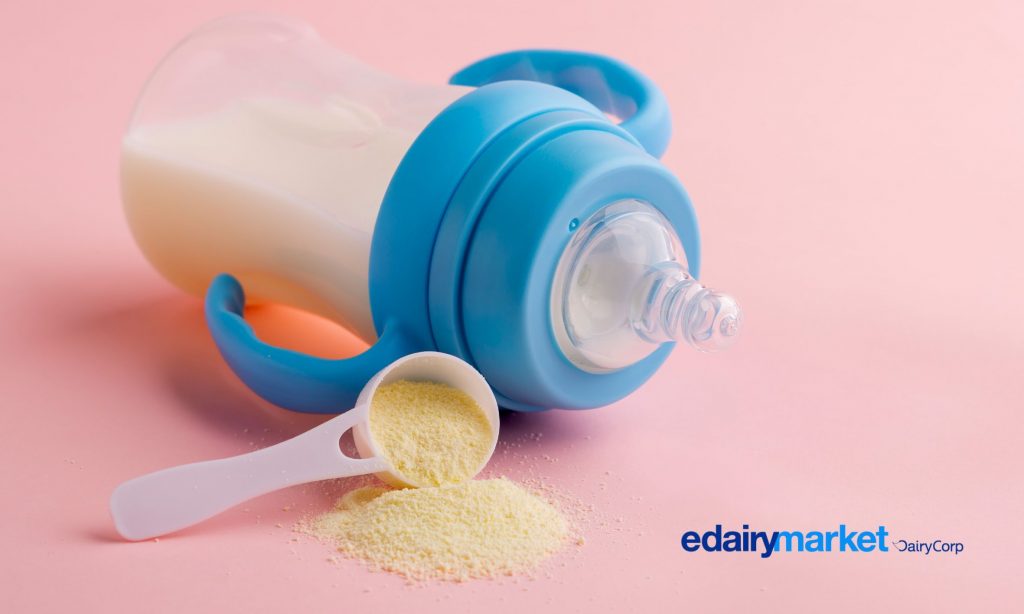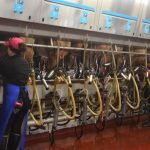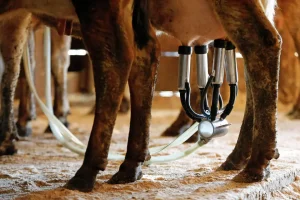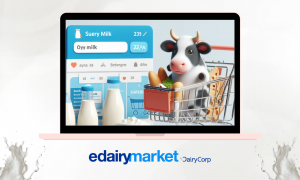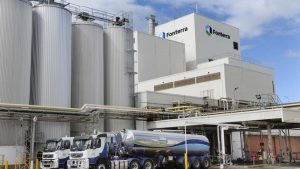
Infant formulas are liquid foods specially designed for infants who cannot be breastfed or who need to supplement their breast milk feedings. These formulas are made to provide the essential nutrients a baby needs for growth and development, including proteins, carbohydrates, fats, vitamins and minerals.
There are different types of infant formulas that are designed to meet the specific needs of babies at different stages of growth, from newborns to older infants. For example, there are formulas for babies who have allergies or intolerances to certain ingredients, formulas for premature babies, formulas for babies who need extra nutrition and formulas for babies who have digestive problems.
It is important to mention that although infant formulas may be a suitable alternative to breast milk, breastfeeding is the preferred choice for infant nutrition as it provides unique benefits for both baby and mother.
But how are formulas produced?

Everything you need to know about infant formulas
Infant formulas are made using a combination of specific ingredients to provide the essential nutrients needed for a baby’s growth and development. Although formulas may vary depending on the manufacturer and type of formula, the basic ingredients typically include protein, carbohydrates, fats, vitamins and minerals.
The ingredients and the process of making a basic infant formula are described below:
Ingredients:
- Proteins: most baby formulas use cow’s milk proteins, which are hydrolyzed or broken down into small chains of amino acids to make it easier for the baby to digest.
- Carbohydrates: mainly lactose and maltodextrin are used, which are sources of energy for the baby.
- Fats: vegetable oils are used to provide essential fats for the growth and development of the baby’s brain and nervous system.
- Vitamins and minerals: vitamins and minerals are added to ensure that the formula provides all the essential nutrients baby needs.
Manufacturing process:
- The dry ingredients are blended and homogenized into a powder.
- The powdered mixture is mixed with warm water and shaken vigorously to dissolve the powder.
- The mixture is cooled and adjusted to the proper temperature for baby’s consumption.
- Necessary vitamins and minerals are added.
- The formula undergoes a sterilization process to eliminate any harmful bacteria or microorganisms.
- The formula is packaged in sterile containers and hermetically sealed until use.
It is important to note that proper preparation of formula is essential to ensure safety and nutritional quality. Parents should carefully follow the manufacturer’s formula preparation instructions and follow storage and usage guidelines to ensure baby’s safety.
Learn about the best Formula Brands:

Everything you need to know about baby formulas.
There are many brands of baby formulas available on the market, and the choice of a brand can depend on a number of factors, such as baby’s specific nutritional needs, personal preferences, availability and costs. The following are some of the most popular and well-rated baby formula brands:
- Enfamil: an infant formula brand that offers a variety of options, including formulas for infants with digestive issues, formulas for premature infants, formulas for infants with allergies, and formulas for infants with special nutritional needs.
- Similac: a brand of infant formulas that offers a variety of formulas designed to meet the specific needs of infants, including formulas for infants with digestive problems, formulas for premature infants, formulas for infants with allergies and formulas for infants who need extra nutrition.
- Gerber: a brand of baby formulas that offers a variety of options, including formulas for babies with special needs, organic formulas, and formulas for babies who need extra nutrition.
- Earth’s Best: a brand of organic baby formulas that uses certified organic ingredients and sustainable sources.
- Hipp: a European baby formula brand that uses organic ingredients and contains no palm oil.
It is important to note that the choice of a baby formula brand should be discussed with the baby’s pediatrician and based on each baby’s individual needs and characteristics.
Countries where formula is most widely consumed:

Everything you need to know about baby formulas.
Consumption varies from country to country and may depend on several factors, such as cultural practices and public health policies. The following are some of the countries with the highest consumption of infant formula:
- China: China is one of the largest consumers of baby formula in the world. The increase in consumption has been attributed to a number of factors, such as increased urbanization and employment rates of women.
- United States: The United States is one of the largest consumers of infant formula in North America. Most babies in the United States are formula-fed for at least part of their first year of life.
- Germany: Germany is one of the largest consumers of infant formula in Europe. German consumers are often considered to be very choosy about the quality and origin of ingredients used in formula.
- France: France is another major consumer of baby formula in Europe. The use of formula is often promoted in France as a way to help women combine work and motherhood.
- Mexico: Mexico is one of the largest consumers of baby formula in Latin America. Formula is often considered a more practical option for working mothers and mothers who are unable or unwilling to breastfeed.
It is important to note that the World Health Organization (WHO) recommends exclusive breastfeeding for the first six months of life and continued breastfeeding along with appropriate complementary foods up to 2 years of age or beyond. If infant formula is needed, it is important to discuss this with the baby’s pediatrician to ensure that the appropriate formula is selected and proper preparation and usage guidelines are followed.
Did you know these facts?
✅ At eDairy Market we have all the dairy categories, all the products and all the companies. We represent you.
✅ Power your business through eDairy Market:
- Your microsite with products, brand and domain of your company at a minimum cost.
- You will be able to sell your products and we do not charge you commission per sale.
- Now you can sell your Products, Ingredients and Dairy Machinery in English, Spanish, Portuguese and Mandarin Chinese.
✅ Create your own online store in a super easy way:
